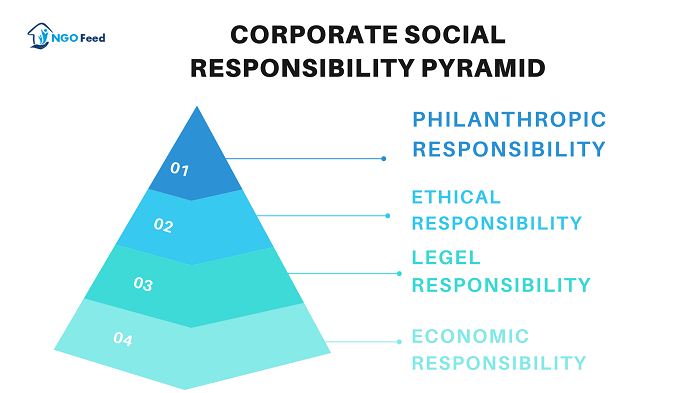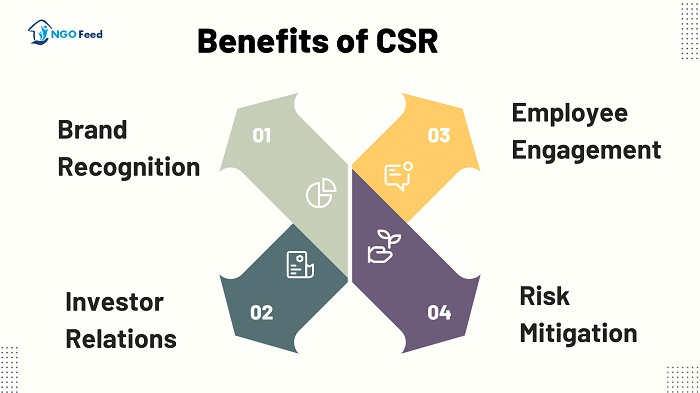CSR Full Form: Corporate social responsibility (CSR) could be a variety of international private business self-regulation which aims to contribute to the societal goals of an activist, philanthropic, or charitable nature by engaging in or supporting volunteering or ethically oriented practices. CSR is usually understood as how an organization achieves a balance of economic, environmental and social imperatives (“Triple-Bottom-Line- Approach”) while at the same time addressing the expectations of shareholders and stakeholders. In this sense, it’s essential to distinguish CSR, which may be a strategic business management concept, and charity, sponsorships or philanthropy. Corporate social responsibility is also called corporate sustainability, sustainable business, corporate conscience, corporate citizenship, conscious capitalism, or responsible business.
Table of Contents
Types of Corporate Social Responsibility
This section will provide you with types of Corporate Social Responsibility (CSR), and it is traditionally broken into four categories: environmental, philanthropic, ethical, and economic responsibility. Let’s check it out in detail.
- Environmental responsibility: It refers to the idea that organizations should behave as environmentally friendly as possible. It’s one of the foremost common styles of corporate social responsibility. Some companies use the term “environmental stewardship” to discuss such initiatives.
- Ethical responsibility: it’s concerned with ensuring a company is working fairly and honestly. Organizations that embrace moral responsibility aim to treat all stakeholders fairly, including leadership, investors, employees, suppliers, and customers.
- Philanthropic responsibility refers to a business’s aim to actively make the globe and society a higher place.
- Economic responsibility: it’s the practice of a firm backing all of its financial decisions in its commitment to try and do good within the areas listed above. The top goal isn’t to quickly maximize profits but to positively impact the environment, people, and society.
Corporate Social Responsibility Pyramid

Read also:
How CSR Approaches?
A more common approach to CSR is corporate philanthropy. This involves monetary donations and aid given to nonprofit organizations and communities. Grants are made in areas such as housing, health, social welfare, arts, education, and the environment, among others, but excluding political contributions and commercial event sponsorship. Below we have mentioned the CSR approaches. Let’s have a look.
- CSR as corporate Philanthropy
- CSR as risk management
- CSR as value creation
Let’s see the details briefly: Where should big corporations spend their CSR resources?
| Particular | Purpose | Impact | Benefits |
|---|---|---|---|
| CSR as corporate philanthropy | Innovative and promotes a sustainable business model | Fundamental strategic and operational impact | >Shared values (business institutions and communities) >Promotes a sustainable business model >Develops human capital (key in developing countries) Incorporated into the business strategy |
| CSR as risk management | Compliance | Medium to high strategic and operational impact | >Mitigates operational impact >Mitigates operational risks >Support external relationships |
| CSR as value creation | Providing funding and skills | Little strategic and operational impact | > Corporate philanthropy and sponsorships > Short-term benefits/not always sustainable > Limited funds available >Impact diluted because the limited budget is allocated to many charities >Corporate competencies and other business assets are not fully utilized. >Misalignment between business and social responsibility strategies and functions >Results in the minimal social and business impact of social programmers. |
Demands of CSR
CSR empowers businesses to control their operations to positively impact society. It states that a company should fulfil its social obligations in addition to doing business.
- Donations of money to various non-profit organization’s assisting people affected by natural disasters such as hurricanes, earthquakes, and drought
- Talent development in sports, entrepreneurship, and cultural events.
- Take steps to reduce air and water pollution, for example.
- Corporations must form a CSR committee to approve the board’s CSR planning and policy practices.
- The act also includes penalties for companies that fail to meet CSR requirements.
Read also: Top 10 NGOs in India
About CSR in India
The Corporate Social Responsibility concept in India is governed by Section 135 of the Businesses Act, 2013, and Rules made thereunder wherein the factors have been provided for assessing the CSR eligibility of a corporation, Implementation and Reporting of their CSR Policies. India’s foremost elaborated CSR mechanism and implementation strategy has started its journey to line a benchmark in achieving sustainability goals and stakeholder activism in nation-building.
CSR Quick Fact (Official Data FY 2023-24 to 2024-25)
Here is the official data (https://www.csr.gov.in/) for how to grow the CSR work across India as a total number of companies, the amount spent, the total number of CSR projects, and much more. Let’s have a look:
| Metric | FY 2023‑24 |
|---|---|
| Total CSR spending | ₹34,909 crore |
| Mandated companies | 1,394 (98% compliance) |
| Major CSR sectors | Education, healthcare, environmental sustainability |
| Top corporate spenders | HDFC Bank, Reliance, TCS, ONGC, Tata Steel |
| Key concerns | Geographic and thematic imbalances, NGO capacity gaps, future strategic focus |
CSR Spent: Top Companies in India
Here in this section, we are providing detailed information about Top Companies CSR spent in Crore. Let’s have a look:
| Company Name | Amount (INR Cr.) |
| RELIANCE INDUSTRIES LIMITED | 922 |
| TATA CONSULTANCY SERVICES LIMITED | 674 |
| OIL AND NATURAL GAS CORPORATION LIMITED | 531.45 |
| HDFC BANK LIMITED | 634.42 |
| INDIAN OIL CORPORATION LIMITED | 445.09 |
| INFOSYS LIMITED | 361.82 |
| BHARAT PETROLEUM CORPORATION LIMITED | 346.46 |
| POWER GRID CORPORATION OF INDIA LIMITED | 346.21 |
| ITC LIMITED | 335.43 |
| NTPC LIMITED | 418.87 |
CSR Spent: Top 10 States
| States | Amount Spent In (INR Cr) |
| Maharashtra | 2797.53 |
| Karnataka | 1145.79 |
| Gujrat | 967.97 |
| Tamil Nadu | 669.65 |
| Delhi | 579.37 |
| Andhra Pradesh | 575.07 |
| Odisha | 504.22 |
| Uttar Pradesh | 435.21 |
| Pan (India other centralized) | 799.18 |
| Rajasthan | 443.35 |
Benefits of CSR

Conclusion
To make a good impact on society while balancing economic, environmental, and social goals, businesses need to practice Corporate Social Responsibility (CSR). CSR is regulated by the Companies Act, 2013 in India. This law stresses how important it is for businesses to contribute to sustainable growth. Organizations can have a big effect by doing things like volunteering, caring for the earth, and acting in an honest way. Businesses perform their social duties and build trust, sustainability, and long-term success in the communities they serve by embracing CSR.
Read also:
Frequently Asked Questions (FAQs)
Why Should a Company Implement CSR?
Many companies view CSR as an essential part of their brand image, assuming customers will be more likely to do business with brands they perceive to be more ethical. In this sense, CSR activities can be essential to corporate public relations. At the same time, some business founders are also motivated to engage in CSR due to their convictions.
What is CSR?
Image result for CSR corporate social responsibility, The term corporate social responsibility refers to practices and policies undertaken by corporations intended to influence the world positively. The key idea behind CSR is for corporations to pursue other pro-social objectives and maximize profits.
How many types of CSR?
Corporate social responsibility is traditionally broken into four categories: environmental, philanthropic, ethical, and economic.
What is a CSR strategy?
CSR strategy is the comprehensive plan companies, and funders use to design, execute, and analyze their corporate social responsibility initiatives. It includes specific focus areas, program design, promotion and communication approaches, and evaluation procedures.
What are the four kinds of CSR?
Environmental, ethical, philanthropic, and economic responsibility are the four main types of CSR. On the other hand, companies can consider various forms of CSR, such as diversity and inclusion, governance, well-being, and employee engagement.
Read also:


I want to set up a charitable trust for raising funds for the Educational requirements of childrens of poor family living in Rural Area and for medical expenses of poor family children’s, Adults. Kindly advise me the procedure, whom to contact to draft required documents, how much does it costs to set up a trust and the minimum amount required
Hey Sir,
Read this article (https://ngofeed.com/blog/what-is-trust-registration/) for complete guidance about trust.
Want guidance to set up a charitable trust
Hey dear,
You have to read this article (https://ngofeed.com/blog/what-is-trust-registration/) for complete knowledge about trust.
i i am nirmala from ria foundation
my working all noida up like free education , health suport program medday mil.
We can help to share your success stories in our portal; to know more information about the campaign, visit: https://ngofeed.com/blog/shareyourstories/
We are n ngo